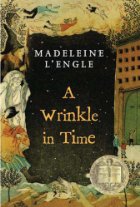
When I heard in September that Madeline L'Engle had died, I had the extremely unusual idea that now would be a good time to re-read her famous Time series of young-adult novels. This notion turned out to be so wildly original that Powell's was completely sold out of all her books when I sauntered over in search of them. Having apparently not learned my lesson after trying to purchase a copy of Timequake a few days after Kurt Vonnegut's death, I was unreasonably shocked by this development. However! A mere month later, there were plenty of copies in stock, so I recently got around to re-reading A Wrinkle in Time. The experience turned out to be a strange, multi-layered exercise in memory, as well as a rediscovery of a good book.
Prior to re-reading Wrinkle, I remembered that I had read it and its sequels as a child, and loved them. But I could bring to mind almost nothing about the book itself. The only things I could recall were that it had a female protagonist, and that there was a scene in which everything in an apparently unplanned scene happened in creepy unison. That was pretty much it. But once I started reading, every passage transformed into an old friend, one that I remembered intimately a split second after encountering it again. Strangely, this wasn't one of those re-readings where each scene spurs memories of what's going to happen next, so that the reader feels like some kind of prophet of five-minutes-in-the-future. No, this was a deep and detailed memory that only came back as I absorbed each passage for a second time. It was an eerie but comforting reading experience.
But at the same time, I was also "remembering" the story through the lens of all the other books I've read in the meantime. It's such an archetypal story - the quest after the missing father, the young people fighting for light in the darkness, the trio of otherworldly helpers that guide them but can't explicitly tell them what to do, the disillusionment with a parent's fallibility, the ultimate triumph of love. When I read the novel the first time, I had much, much less experience of these ubiquitous story elements than I do now. I had very little "novel sense"; I didn't get instinctual insight about the story's direction, as I lacked the experiential base of having absorbed hundreds upon hundreds of novels over the course of many years. A Wrinkle in Time was probably in the first or second wave of novels that I read myself; I was just starting out on my lifetime love affair with the written word. It was a fairly bizarre experience to revisit a story I have literally read before, but which I read with a much a much blanker literary experience than I have now. While I was remembering L'Engle's story as I re-absorbed it, I was also "remembering" it into a shared tradition of coming-of-age quest stories extending from Homer's Odyssey to Rowling's Harry Potter books. That sort of cultural recognition is something I've become accustomed to as part of my reading process, so it was fascinating to be reminded of a time before I had consciously acknowledged any of this literary context, before I was saying to myself "Oh, I recognize this; here's the part where (the protagonist is tempted by the side of evil, the idol shows itself to be flawed, the oracle gives unwelcome insight, the hero(ine) must continue on alone, etc.)". All in all, this re-reading was a very complicated act of remembering indeed.
Which seems so perfectly appropriate, given that Wrinkle is all about connecting instinctually with one's place in the human history of moral struggle - how coming of age means taking up the mantle of luminaries that have gone before, and finding one's own way while still gathering strength from their example. Recognizing this idea from other novels is sort of a meta-example of the idea itself. In other words, I sort of created my own little time-wrinkle just by reading books! How cool is that?
In my opinion: very cool.


Very cool indeed.
-scarymary
I did the same thing, though I already owned the book, and had re-read it as an adult. On my third or fourth go-round with the book (and I'd read many of her other books as well), one of the things that was most prominent and interesting this time was that religious themes seemed to be underlying much of the story. I noticed that more this time through after reading about L'Engle's overt Christianity and that she wrote quite a bit on the subject. It's discomfiting, finding those influences in my childhood favorites, but it's interesting as well to see how it's woven in, and I still love the story and the writing.
L'Engle's books form the weft of the literary fabric of my adolescence. They are the books I compared everything else to. Even when I have disagreed with her vehemently, I read her books. (I've even yelled at her, in my head.) I just read a passage from The Irrational Season at my best friend's wedding last week.
I enjoy your reading of Wrinkle -- you see things and think about things I've never seen or thought about while reading it.